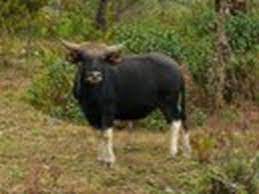Today’s Current Affairs: 22nd Sep 2023 for UPSC IAS exams, State PSC exams, SSC CGL, State SSC, RRB, Railways, Banking Exam & IBPS, etc
Table of Contents
Mithun : Food Animal Tag

Northeast’s Mithun gets a ‘food animal’ tag from the Food Safety and Standards Authority of India (FSSAI).
- The Mithun or gayal (Bos frontalis) is considered a descendant of the Indian Gaur or bison.
- It plays an important role in the socio-economic and cultural life of tribes such as the Nyishi, Apatani, Galo and Adi in Arunachal Pradesh.
- It is distributed in Northeast India, Bangladesh, northern Myanmar and in Yunnan, China.
- It is known as the ‘cattle of the mountain’.
- The gayal is the state animal of Arunachal Pradesh and Nagaland.
- It has a lot of business potential and the potential to provide nutritional, livelihood and financial security.
- The Indian Council of Agricultural Research launched the M-ANITRA app to register Mithun farmers as “buyers” and “sellers” with the aim of helping them do business at competitive prices.
- Conservation status
- IUCN: Vulnerable
- CITES: Appendix I.
Food Safety and Standards Authority of India:
- It is a statutory body established under the Food Safety and Standards Act, 2006 (FSS Act).
- FSS Act of 2006 consolidated various acts & orders that had earlier handled food-related issues in various Ministries and Departments.
- Nodal ministry: Ministry of Health & Family Welfare.
SIMBEX 23:

Indian Naval Ships Ranvijay and Kavaratti and submarine INS Sindhukesari arrived in Singapore to participate in the 30th edition of the Singapore-India Maritime Bilateral Exercise (SIMBEX).
- SIMBEX 23 is an annual bilateral Naval exercise between the Indian Navy and the Republic of Singapore Navy (RSN).
- It has been conducted since 1994.
- It holds the distinction of being the longest continuous naval exercise that the Indian Navy has conducted with any other country.
- SIMBEX-2023 is being conducted in two phases – a harbour Phase at Singapore from September 21 to 24, 2023, followed by a Sea Phase.
- Besides Ranvijay, Kavaratti, and Sindhukesari, Long-Range Maritime Patrol Aircraft P8I is also participating in the exercise.
- The Harbour Phase will witness a wide range of professional interactions, cross-deck visits, Subject Matter Expert Exchanges (SMEE), and sports fixtures, aimed at enhancing interoperability and mutual understanding between the two navies.
- The Sea Phase of SIMBEX 23 will involve complex and advanced air defence exercises, gunnery firings, tactical manoeuvres, anti-submarine exercises, and other maritime operations.
- Units of both the navies will endeavour to hone their war-fighting skills while consolidating their capability to undertake multi-discipline operations jointly in the maritime domain.
Supra Thermal & Energetic Particle Spectrometer:

India’s solar mission, Aditya L1, has started studying energetic particles in the solar wind from space with the help of a device named Supra Thermal & Energetic Particle Spectrometer (STEPS).
- It is a sub-system of the ASPEX (Aditya Solar Wind Particle Experiment) payload on the spacecraft.
- The key aim of STEPS is to study the environment of energetic particles from the spacecraft’s position on the L1 point till it will function.
- The data from STEPS in the long term will also help us understand how space weather changes.
- It comprises six sensors, each observing in different directions and measuring supra-thermal and energetic ions.
- The data collected during the Earth’s orbit helps scientists analyse the behaviour of particles surrounding the planet, especially in the presence of its magnetic field.
- It was developed by the Physical Research Laboratory (PRL) with support from the Space Application Centre (SAC) in Ahmedabad.
Aditya L1:
- Aditya (which in Sanskrit means sun) is a planned coronagraphy spacecraft to study the solar atmosphere (solar corona, – outermost part).
- It has been designed and developed by ISRO and various other Indian research institutes.
Nuakhai Juhar : Social Festival

The Prime Minister of India greeted the people on the auspicious occasion of Nuakhai Juhar.
- Nuakhai Juhar is an important social festival of Western Odisha and adjoining areas of Simdega in Jharkhand.
- The word nua means new, and khai means food.
- Objective is an agricultural festival which is observed to welcome the new rice of the season.
- It is observed on the fifth day of the lunar fortnight of the month of Bhadrapada or Bhadra (August–September), the day after the Ganesh Chaturthi festival.
Rafflesia Flower : Risk Of Extinction

Most species of the famously large Rafflesia flower are now at risk of extinction, new research warned recently.
- Rafflesia is a genus of parasitic flowering plants native to Southeast Asia.
- These plants are renowned for producing the largest individual flowers in the world, both in terms of size and weight.
- They are often referred to as “corpse flowers” due to their foul odour.
- They inhabit specialised localities in the tropical rainforests of Sumatra, Java, Borneo, Peninsular Malaysia, southern Thailand and the Philippines.
- There are 42 known species of Rafflesia, and the most famous species within this genus is Rafflesia arnoldii.
- They are massive and can reach up to 3 feet (almost 1 meter) in diameter and weigh up to 7 kg.
- They are parasitic, meaning they do not have leaves, stems, or roots like traditional plants.
- Instead, they depend on a host vine called Tetrastigma for nutrients and support.
- Rafflesia’s only visible part is the flower.
Feline Panleukopenia virus : Seven Leopard Cubs

In the last one month, seven leopard cubs at Bannerghatta Biological Park in Bengaluru have died after being infected by the feline panleukopenia virus.
- Feline Panleukopenia Virus is a highly contagious viral disease of cats.
- It is also known as Feline Distemper, which is a life-threatening infectious disease.
- It infects and kills the rapidly growing and dividing cells in the body, including cells in the bone marrow, intestines, and skin, and in a developing fetus.
- Once infected by Feline panleukopenia virus, the intestine of the animal gets completely affected.
- They develop severe diarrhoea, vomiting and dehydration, which ultimately leads to death.
- It spreads faster, and the infected animal dies within four to five days.
- There is no specific treatment for feline panleukopenia.
- Dehydration is treated with aggressive intravenous fluid therapy, while clinical signs of vomiting and diarrhea are treated with prescription medications.
Truenat Test : To Detect Nipah

Kerala has been accorded sanction by the Indian Council for Medical Research (ICMR) to use Truenat test to diagnose Nipah.
- Truenat test uses a portable, smart chip-based, battery-operated RT-PCR (Reverse Transcriptase-Polymerase Chain reaction) kit to detect the presence of the virus in a sample.
- Truenat is the first kit in India to receive Emergency Use Authorization (EUA) by the Drug Controller General of India (DCGI) for conducting Nipah virus tests.
- Truenat can be used in hospitals that have level 2 biosafety facilities, where there are certain strict protocols in place to prevent contamination of samples.
- Truenat can help conduct tests faster, detect if there is an outbreak, and set preventive measures faster.
Nipah Virus:
- It is a zoonotic virus (it is transmitted from animals to humans).
- The organism that causes Nipah Virus encephalitis is an RNA or Ribonucleic acid virus of the family Paramyxoviridae, genus Henipavirus, and is closely related to Hendra virus.
- Hendra virus (HeV) infection is a rare emerging zoonosis that causes severe and often fatal diseases in both infected horses and humans.
- It first broke out in Malaysia and Singapore in 1998 and 1999.
- The disease is named after a village in Malaysia, Sungai Nipah, where it was first detected.
- It first appeared in domestic pigs and has been found among several species of domestic animals including dogs, cats, goats, horses and sheep.
- Transmission:
- The disease spreads through fruit bats or ‘flying foxes,’ of the genus Pteropus, who are natural reservoir hosts of the Nipah and Hendra viruses.
- The virus is present in bat urine and potentially, bat faeces, saliva, and birthing fluids.
- The human infection presents as an encephalitic syndrome marked by fever, headache, drowsiness, disorientation, mental confusion, coma, and potentially death.
Green Nudge:

A study conducted in China has shed light on the positive environmental impact of implementing “green nudges” in online food delivery platforms.
- Green nudges are interventions that encourage people to act more sustainably.
- They are a relatively new policy tool that aims to encourage pro-environmental behaviour.
- By defaulting to “no disposable cutlery” and rewarding customers with “green points,” this simple change led to a 648% increase in no-cutlery orders, offering potential benefits for both the environment and consumer behaviour.
- The study estimated that over 18 months in Shanghai, more than 225.33 million sets of single-use cutlery (SUCs) were reduced, potentially preventing 4,506.52 metric tonnes of waste and saving 56,333 trees.
- India’s leading online food delivery platform, Zomato, introduced similar nudges, leading to a substantial reduction in cutlery waste.
Green Nudge:
- India : Zomato’s “no-cutlery” option; Government’s LiFE movement, promoting environmentally conscious living
UK : “The Big Switch Off” campaign to save energy by encouraging people to turn off lights and appliances when not in use. - Netherlands : “Pay as you throw” policy for garbage collection, where residents pay based on the amount of waste they produce, incentivizing reduced waste generation.
- USA: San Francisco’s ban on plastic bags discourages their use and promotes reusable alternatives.
Ethical Artificial Intelligence (AI):

Some business leaders emphasized the Imperative of collaboration among governments, industry, and ecosystem players to develop Ethical Artificial Intelligence (AI).
- Artificial Intelligence (AI) is the ability of a computer, or a robot controlled by a computer to do tasks that are usually done by humans because they require human intelligence and discernment.
- Although there is no AI that can perform the wide variety of tasks an ordinary human can do, some AI can match humans in specific tasks.
- Ethical AI, also known as Moral or Responsible AI, refers to the development and deployment of AI systems in a manner that aligns with ethical principles, societal values, and human rights.
- It emphasizes the responsible use of AI technology to ensure that it benefits individuals, communities, and society as a whole, while minimizing potential harms and biases.
Ethical issues highlighted in this case are:
- Copyright Infringement Authors accuse OpenAI of using their work without permission, raising concerns about intellectual property rights.
- Fair Use Debate OpenAI and other AI defendants argue that their data usage falls under fair use, sparking a debate about the boundaries of copyright law in the AI era.
- The use of unauthorized data, possibly from illegal sources, raises questions about respecting authors’ privacy and consent in AI training datasets.
- The transparency of AI training data sources and the responsibility of AI providers in ensuring ethical data usage are questioned.
- AI-generating content resembling authors’ work could potentially mislead readers
Paryushan Parv : Festival Of Jainism

Paryushan Parv is a significant festival in Jainism, observed by both Digambara and Shwetambar communities.
- It is a time for deep reflection, repentance, and redemption for Jains.
- Paryushan Parv inspires individuals to cultivate virtuous qualities. It involves fasting, penance, meditation, and self-reflection, aiming for soul purification and vowing to avoid future transgressions. It’s a time for seeking righteousness and spiritual purity, ultimately aiming for salvation.
- Five Duties of Paryushan: These include Samvatsari (forgiveness and reconciliation), Keshlochan (introspection and self-improvement), Pratikraman (seeking forgiveness for past wrongdoings), Penance (commitment to spiritual growth), and self-criticism and apology for past mistakes.




